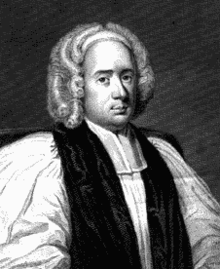This semester I am teaching a course entitled “Philosophy of the Afterlife,” which covers a range of issues, including the concept of human immortality, near-death experiences, reincarnation, the doctrines of heaven, hell, and purgatory, and the prospect of achieving immortality via computer technology. Since this is my first time to teach such a course, I thought it would be fun to post some of my thoughts along the way. I begin with a critical reflection on one of Joseph Butler’s arguments for human immortality.
*****
In his 1736 book The Analogy of Religion, the English bishop and apologist Joseph Butler offers some arguments in defense of life after death. His overarching aim with these arguments is not to prove that human beings are immortal but rather to show that we have no good reason to believe that our lives end with the death of our earthly bodies. Here I will explain and critically assess one of his arguments.

Butler asks us to “consider what the analogy of nature” might suggest to us regarding what death truly entails. And he observes that throughout nature we find immense variety, constant change and “degrees of life and perception” among living things. And in each individual human life we find a vast transformation from our lives in the womb to adulthood. Thus, Butler concludes, “that we are to exist hereafter in a state as different (suppose) from our present as this is from our former is but according to the analogy of nature.”
Furthermore, Butler argues, there is no evidence that death brings complete extinction of the self. What we do observe is merely “the dissolution of the flesh, skin, and bones,” but “these effects do in no wise appear to imply the destruction of the living agent.” Such physical decay indeed “destroys the perceptible proof which we had before their death of their being possessed of living powers, but does not appear to afford the least reason to believe they are then, or by that event, deprived of them.” In other words, when person dies, the destruction of her body only eliminates positive evidence that she is still alive. But it does not prove she is no longer alive. This is an important distinction. Lack of evidence for X does not necessarily constitute evidence for not-X.
In this way, Butler defends what I will call the “survival thesis”—the notion that human beings survive death in the sense that their conscious lives continue somehow despite the destruction of their physical bodies. So what are we to make of his claims? While Butler’s argument is carefully nuanced, aiming just to show that we have no good reason to reject the survival thesis, as opposed to positively arguing for that thesis, some counter-arguments might rebut his defense.
First, one might argue that Butler’s analogy from nature has been rendered irrelevant by the advance of science. As many naturalists have pointed out, neurophysiology reveals a much more specified analogy that points in the direction of extinction of the self. As a person develops from infancy to adulthood and then to old age, her cognitive capacities correspond entirely to her brain functionality. As brain function deteriorates, so does one’s mental function. And where there is serious damage to the cerebral cortex, there is likewise damage or even complete elimination of the cognitive operations for which that part of the brain is responsible. What this suggests is that with the complete destruction of the brain there will likewise result complete cessation of cognitive function, and this is tantamount to extinction of the person.
Second, one might challenge—as again many naturalists have—Butler’s assumption that the burden of proof is on the naturalist to show that the survival thesis is false. Why make this assumption when arguably there is no independent philosophical or scientific evidence to suggest that the survival thesis is true? Presumably, Butler helped himself to this assumption because at the time and place of his writing—early 18th century Europe—belief in life after death was far more widely affirmed among scholars than it is today in the West. So this presupposition regarding evidential burden was not controversial for his readers. Things have changed dramatically during the intervening 280 years, however. These days most Western scholars are religious skeptics, and a large number are bona fide naturalists. Accordingly, among scholars today the burden of proof regarding the survival thesis seems to rest squarely on the shoulders of those who affirm it. One wonders how Butler’s approach to the issue would be different were he writing on the subject today.

Leave a Reply